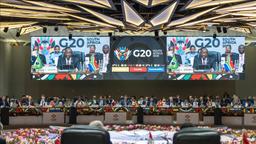Related Publication Files

Researchers evaluated trends in inequality and national policies to tackle inequality in G-20 countries.
ANKARA – The Civil G20 group, composed of NGOs and academics from member states, convened in the context of the G20 activities this year under the presidency of Russia analyzed the national policies of member states in terms of reducing inequality. The Turkey chapter of the report, which also involved proposals for strong growth, was prepared by TEPAV.
The report, titled “Civil-20 Proposals for Strong, Sustainable, Balanced, and Inclusive Growth,” was prepared by a group of researchers from member states in partnership with the United Nations Development Programme and was coordinated by the International Organizations Research Institute of the National Research University Higher School of Economics (IORI HSE) and the G20 Research Group of the University of Toronto. The report presents a series of proposals to decision-makers of G20 countries and aims to contribute to the policy debate in member states on overcoming economic inequalities.
Problem areas in Turkey
The Turkey country report, authored by TEPAV Research Associate Feride İnan, stressed that in spite of the substantial economic progress made in the aftermath of the 2001 crisis, Turkey faced a high rate of inequality compared to other countries. Pointing at the deep income gaps between regions as well as between rural and urban areas, İnan referred to the high rate of informality particularly in the agricultural sector, the low level of access to income-generating opportunities such as education among children from lower income groups, and structural problems in the tax system which rather than contributing to social welfare intensified imbalances in income distribution.
Steps taken to reduce inequalities
The report stated that the investment incentive scheme tailored to overcome regional disparities in development made a positive contribution to the reduction of inequalities throughout the country. It also highlighted the role of the policy framework aimed to ensure a 100% schooling rate in primary education, measures to improve women and youth employment, and the expansion of health coverage in reducing inequalities.
The report is accessible at http://en.g20russia.ru/news/20130516/781345432.html.




